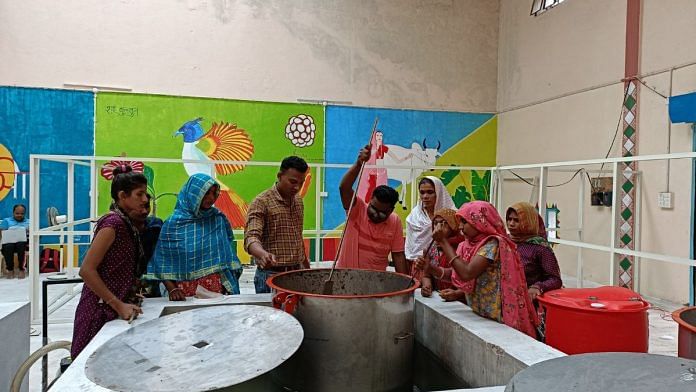Bhopal: Factory manager Ankita Bhabar, 24, had no money to pay her staff. Under the aegis of the Madhya Pradesh government, her self-help Bhilala tribal group had opened the state’s first legal mahua-based liquor plant eight months ago in the Alirajpur district’s Katthiwada block. But since production started in January, they were unable to sell a single bottle. Farmers were demanding payments; employees were threatening to walk out—and then the phone rang. It was district excise in charge, Brijendra Kori.
“We have sold 26 boxes of mahua. Rs 4 lakh has been credited to your account,” he told Bhabar.
This was in August—exactly one year after Chief Minister Shivraj Singh Chouhan declared mahua as a heritage liquor. Since then, orders have been pouring in from government-owned hotels and wine stores in Bhopal, Indore, Ratlam, Narmadapuram, Chhatarpur, and other parts of Madhya Pradesh. The Katthiwada block plant has sold half of its inventory of 320 boxes—each containing 12 bottles of 750 ml that retail at Rs. 800. Smaller, 180 ml bottles are priced at Rs 200. The unit has earned Rs 20 lakh through sales.
Sold under the brand name ‘Mond’ with a logo of a prancing horse on a yellow label, the clear distilled spirit has no additives or artificial flavouring. It’s part of a massive rebranding effort to market a drink that was traditionally sneered at. According to officials, it’s being marketed to the “elite class” on account of its small-scale production and limited availability. Labels like ‘artisanal’ and ‘organic’ appeal to a new generation of buyers looking for something niche, natural, and novel.
In September, the Gond tribe self-help group from Bhakha Mal village in Dindori district opened its own manufacturing plant. The heritage spirit produced here will be sold under the brand name ‘Mohulo’—the logo is a pink and green tree of life.
It is a way to correct a historic wrong, says deputy excise commissioner
For the Bhilala community in Alirajpur—one of the poorest districts in Madhya Pradesh—this change in fortune is surreal, if not ironic. For generations, Adivasis were pilloried for their choice of alcohol—first by the British colonisers who deemed their locally brewed liquor to be adulterated and dangerous for consumption. And then, even after Independence, little changed.
“It is a way to correct a historic wrong, by giving the tribal SHGs the right to distil and produce alcohol using mahua flowers,” said deputy excise commissioner Rajesh Henry.
If Goa has its feni, and Kerala has toddy, then Madhya Pradesh can also market their mahua spirit.
So far, the liquor is sold within Madhya Pradesh, but the Shivraj Singh Chouhan government wants to put the heritage spirit on the national map by exporting it to other states.
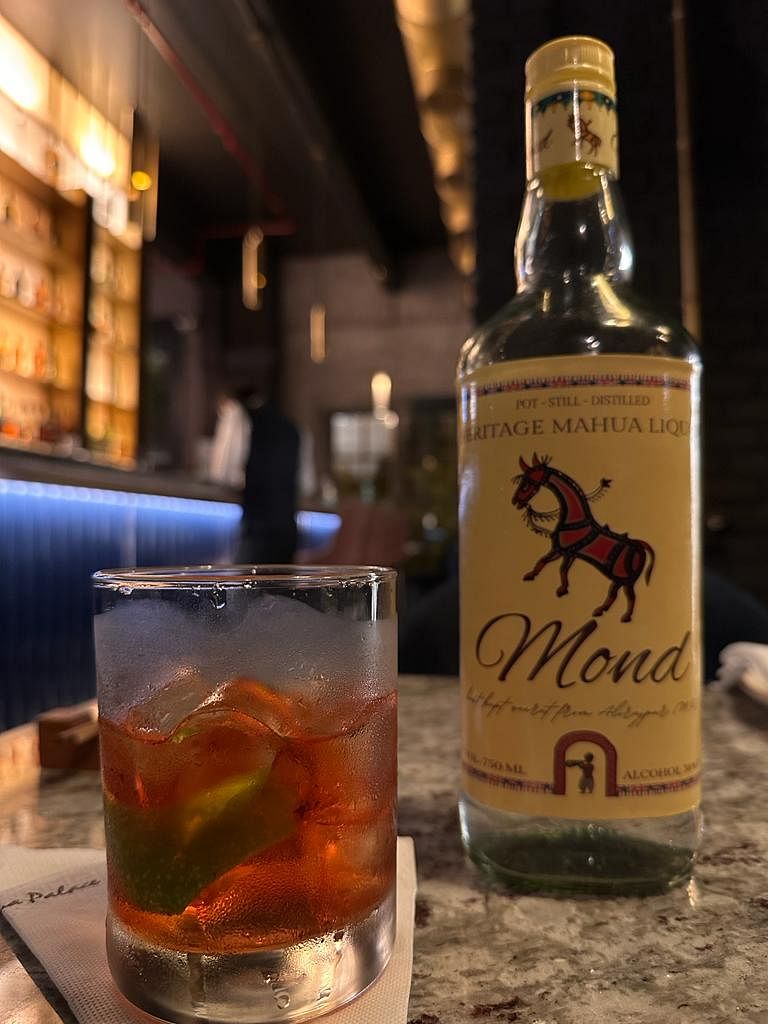
Also read: Punjab’s most hated—sacrilege accused live in hiding, face death, can’t use phones
Smooth like scotch
Even before Mond and Mohulo hit the shelves, tasting sessions were organised for bartenders from the Taj, Marriott and other five-star hotel chains. Unlabelled samples with feedback forms were sent to restaurants and bars operated by the Madhya Pradesh tourism department for customer reviews and suggestions.
Vinay Kumar Bangar, a resident of Ratlam who has tried Mond, describes it as being very close to scotch.
“It has a flowery taste and is an easy and smooth alcohol,” said Kumar. Now, there’s always a bottle of Mond in his personal collection of single malts, rum, vodka and whisky.
Bhopal’s popular Winds and Wave restaurant overlooking the Bhoj Tal (upper lake) was one of the first places where the liquor was tested.
“We had people who liked the flavour so much that they went looking for it at outlets outside. When they could not find it, they came back and complained,” said Kamal Sharma, the bar attendant at Winds and Wave, where Mond is now sold in pegs.
“Many customers found it so unique that they wanted to purchase the whole bottle, but we don’t sell bottles,” he added.
Mond is most popular among people who have tasted locally distilled mahua, but now they like the new refined version of it, says Ambi Wines’ co-founder Jitendra Patidar
In the three months since Winds and Wave made its first purchase—one box of nine litres—it has sold 50 per cent of the stock.
“Any new alcohol takes time and effort in marketing for it to pick up. Mond is most popular among people who have tasted locally distilled mahua, but now they like the new refined version of it,” said wine and fruit processing company Ambi Wines co-founder Jitendra Patidar.
It was the youth who were most excited about it, says deputy excise commissioner
At many tasting sessions, Henry noticed that young working professionals were particularly enamoured by the spirit of mahua.
“The overall feedback was that it is a good alcohol. But it was the youth who were most excited about it. They are the ones who want to explore more,” said Henry.
Today, Mond and Mohulo can be bought at Indore and Bhopal airports as well. But the first big order was from Ambi Wines— 26 boxes to be sold at 50 outlets across 27 districts.
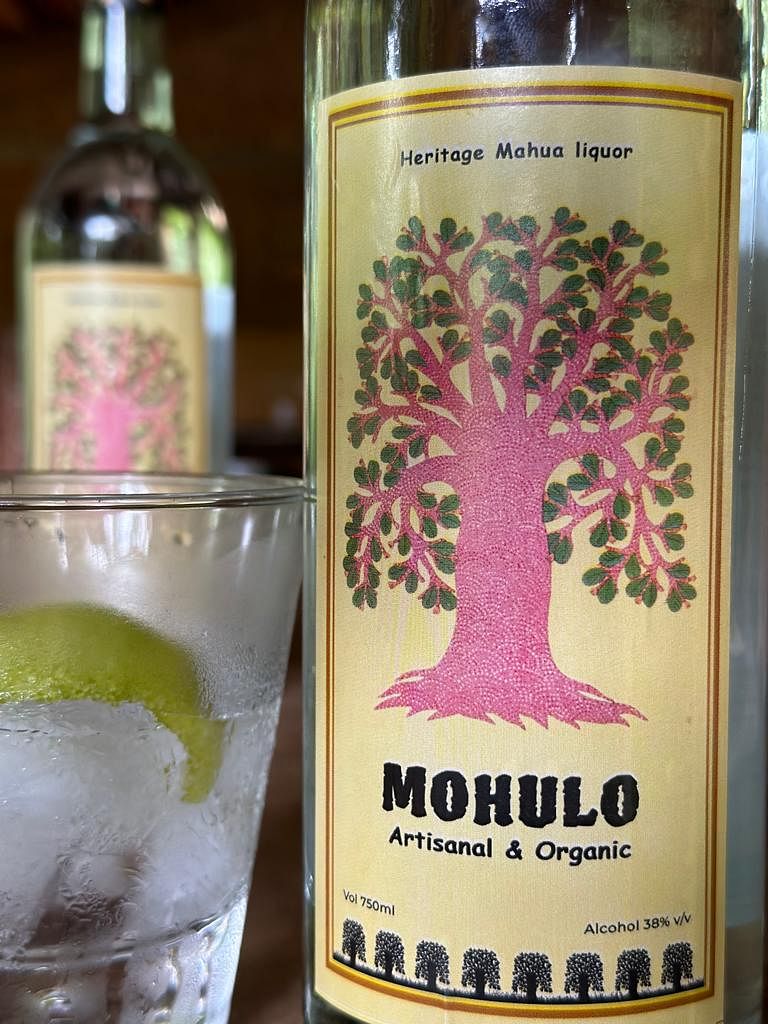
The first order
Bhabar was ecstatic when the district excise in charge told her about Ambi Wines’ order. She ran to her father in the adjoining room where he was busy managing the plant’s RO machine and urged him to quickly check his cell phone for any message from the bank.
“He cannot read English, but he read the digits out loud. It was in green with a plus sign marking the credited amount. At that moment I felt everything would be okay from here on,” she said with a big grin.
But there was a problem with the shipment that reached the Ambi Wines warehouse in Ratlam. The labels were not affixed properly. Some were lopsided; others were not centrally aligned.
“When the dealer told us that they could not accept the order, we were heartbroken. We requested them to not return it as we were all learning how to package the product for the first time,” said Kansingh Chouhan who works as a lab assistant at the Mond plant.
Patidar stepped in and fixed the labels at his own cost in the warehouse. Soon, the Madhya Pradesh government requested him to teach the women of Hanuman self-help group how to affix labels on bottles. To date, Ambi Wines has purchased 300 boxes of Mond, and has sold 80 per cent of its stock.

Also read: UP is the new liquor capital—Record revenues, home bars, model shops. Yogi govt loving it
Growing enterprise
Word of the Alirajpur distillery’s success is spreading to other tribal-dominated districts in Madhya Pradesh. Many Adivasi groups have already completed a training programme with Bhabar’s team. And now, SHGs from four more districts—Shahdol, Barwani, Dhar and Khargone—are ready to start their own distilleries.
While the Alirajpur and Dindori plants were set up by the government at the cost of Rs. 1 crore each, other SHGs can apply for interest free loans to set up similar units.
“We were very sure that the distillation of alcohol would be with the SHGs only. We are training them to establish their business, but they will have to learn to eventually sustain it,” said Principal Secretary at State Government Department of Commercial Tax, Deepali Rastogi.
To boost sales, the heritage liquor will be duty free with no value added taxes. As an added bonus, no excise duty will be levied on the alcohol for another seven years. SHGs can also tie up with local distributors on a profit-sharing basis.
That said, the government was actively involved in setting up Madhya Pradesh’s first state-run mahua distillery at Alirajpur. An old warehouse near Katthiwada’s main square, which was used to store tendu patta (Indian ebony leaves) was spruced up and given a fresh lick of paint.
In one room, a group of four women with blue coats over their saris, their hair nearly covered in caps, sift through mounds of dried mahua flowers. In another, men carry logs of wood to fuel a massive boiler. The third room is where the alcohol is distilled.

Large cooking pans boil and bubble in one corner, while a shiny steel distiller buzzes in the background as clear alcohol condenses and drips into a white can. The aroma of distilled mahua fills the air. Solar panels in the courtyard power the machines.
Rekha Wakale, who was sorting through the flowers with Geetha Tomar, suppressed a grin. Both are in their early 20s. “We are all largely teetotallers but here we were told that we have to taste each batch of alcohol,” Wakale said. Now, she and others have become skilled at identifying variations in each batch.
Wearing a red T-shirt and a pair of black jeans, Bhabar oversees the operations. The tiny plant can distil 200 litres of alcohol every day.
But residents in Alirajpur are still waiting for Mond to be sold in the district.
“We are very proud that a drink rooted in our culture and tradition is commercially produced and sold, but it should also be made available to us,” says Sanjay Mistry, a Bhilala community member who runs a small eatery in Katthiwada.

Notes of mahua
None of this would be possible without Aniruddha Mookerjee, he was director of programs at Wildlife Trust of India (WTI) and has an encyclopaedic knowledge of India’s indigenous liquor. He was the first person whom officials spoke to in 2021.
“The art of distilled alcohol goes as far back as 1300 BC during the Indus Valley civilisation; in this sense, India can be called the cradle of distilled liquor. There are at least 50 different varieties of desi daru (locally brewed alcohol),” explained Mookerjee.
He estimates that mahua is older than arrack—distilled alcohol made from coco plum or rice—and should qualify as India’s national drink given that it is consumed in as many as 13 states.
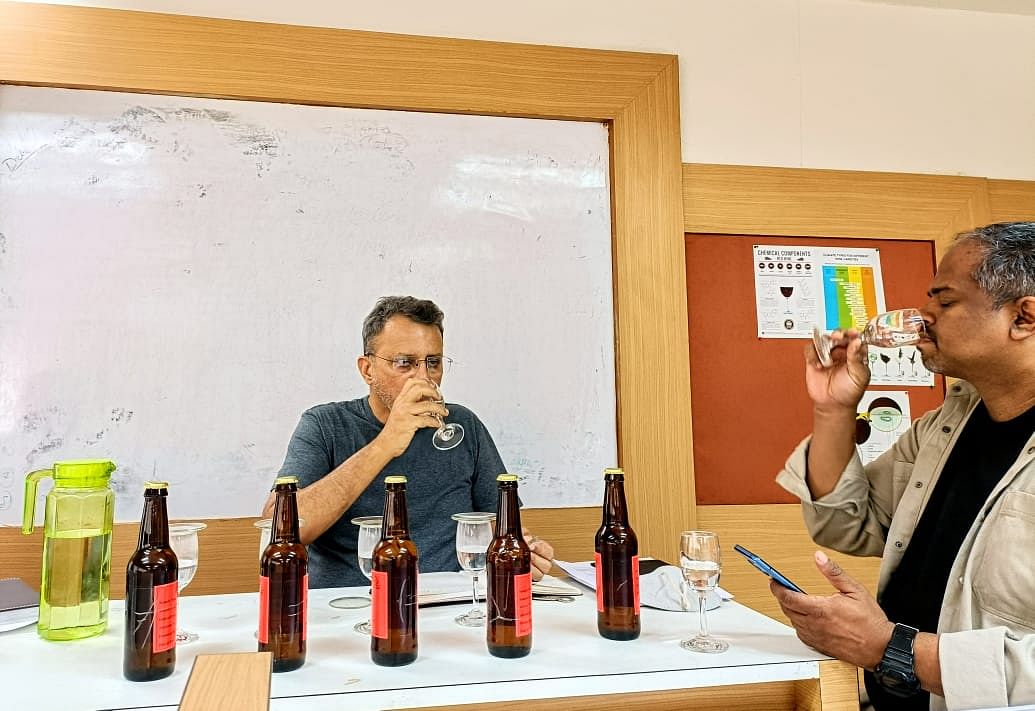
Along with Henry, Mookerjee got down to fixing the flavour. It was important to replicate the smooth, soft texture and the mildly sweet floral notes of the mahua alcohol, made in small batches at homes.
Water and soil composition subtly alters the taste of the mahua spirit, says Mookerjee
Their flavour journey took them to the Vasantdada Sugar Institute (VSI) laboratory in Pune. After one year of testing and tasting, Mookerjee was satisfied. They had finally produced a mahua-based spirit similar to what Adivasis prepared in their homes. Entrepreneur Hanzel Vaz, whose Cazulo Premium Feni is as iconic an image of Goa as its beaches and coconut trees, also weighed in on it.
“Water and soil composition subtly alters the taste of the mahua spirit, which is why the alcohol produced in Alirajpur came to be known as Mond while in Dindori, it is known as Mohulo,” said Mookerjee.
But production in small batches at a laboratory is not the same as large quantities distilled at the plants.
“Every batch will have slight variations. But that is the beauty of handcrafted alcohol; it is like singing a raga,” added Mookerjee.
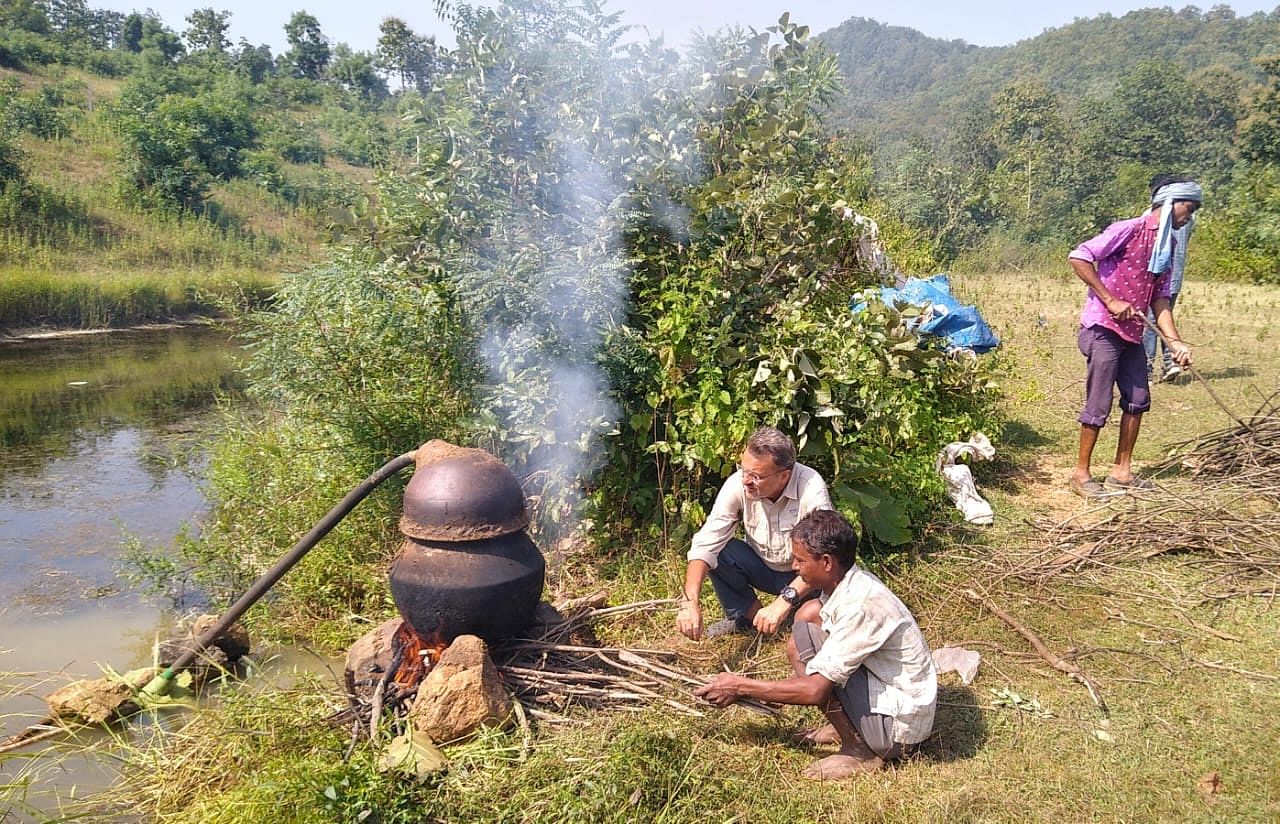
Also read: It’s alcohol and it’s Ayurvedic — how Kerala drinkers are beating booze lockdown
Tribal women at centre
The Madhya Pradesh government took a leaf out of Odisha’s book— to legalise the production of mahua liquor. But unlike in Odisha, where the distillers are mainly run by non-tribals, Madhya Pradesh has only permitted Adivasi SHGs to produce mahua-based alcohol in 20 districts by amending the Madhya Pradesh Excise Act 1915 in August 2021.
Today, the women of Hanuman self-help group in Katthiwada control every part of the production process—from procuring mahua from farmers to distilling and packaging the final product in glass bottles ready to be shipped off.
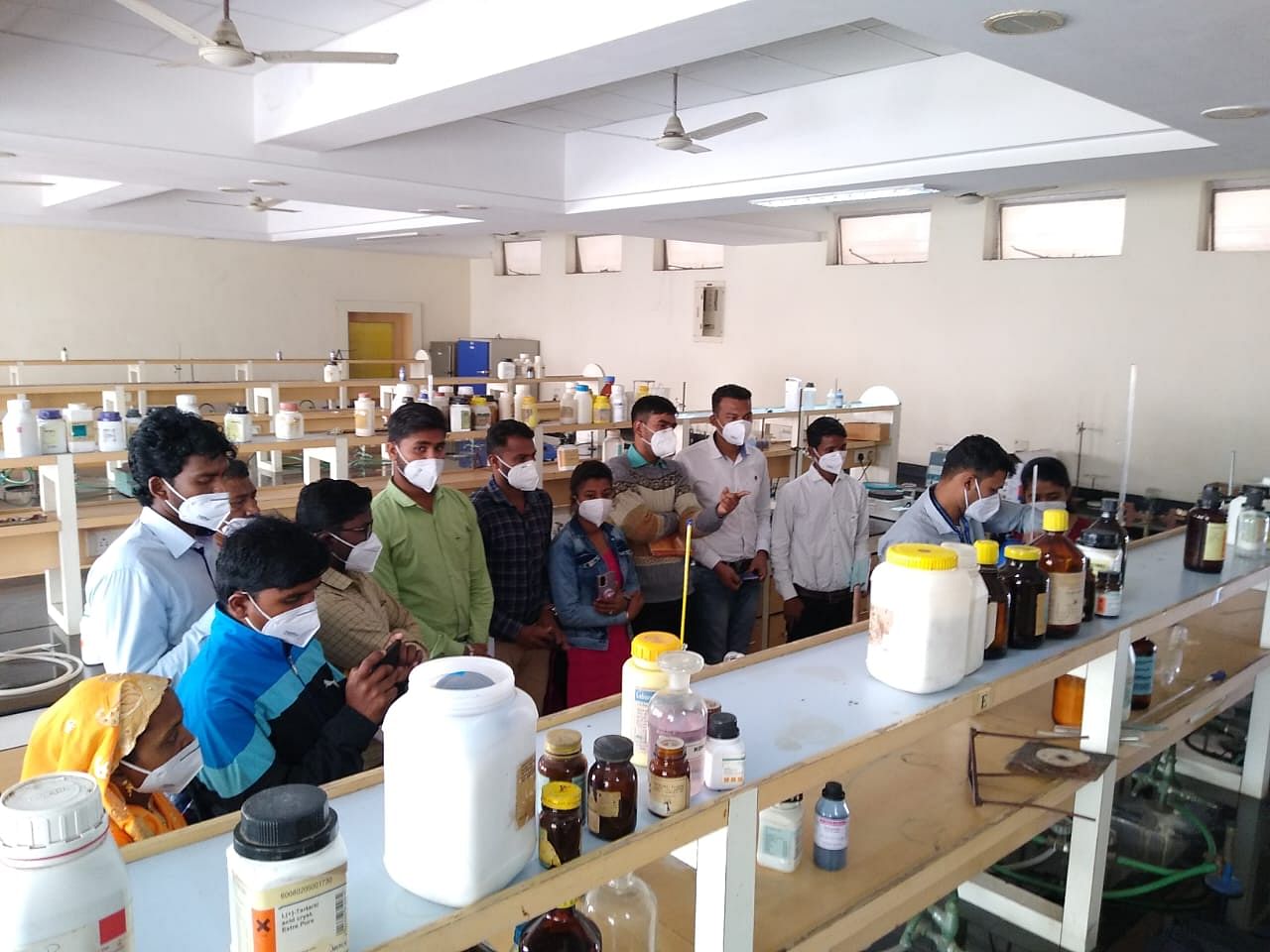
For Tomar and Wakale, work starts at 8 am by cleaning mounds of dry mahua flowers. When they make the spirit at home, they soak whole flowers in water with yeast from previous batches for 15 days to allow fermentation to kick in.
“But here at the factory, it is first ground and then fermented for around two days in giant blue plastic drums,” said Tomar.
According to Bhabar’s mother Bholi Bhabar, who also works at the plant, the alcohol they distil in the factory is very strong. “What we produce at home is mild in comparison,” she said.
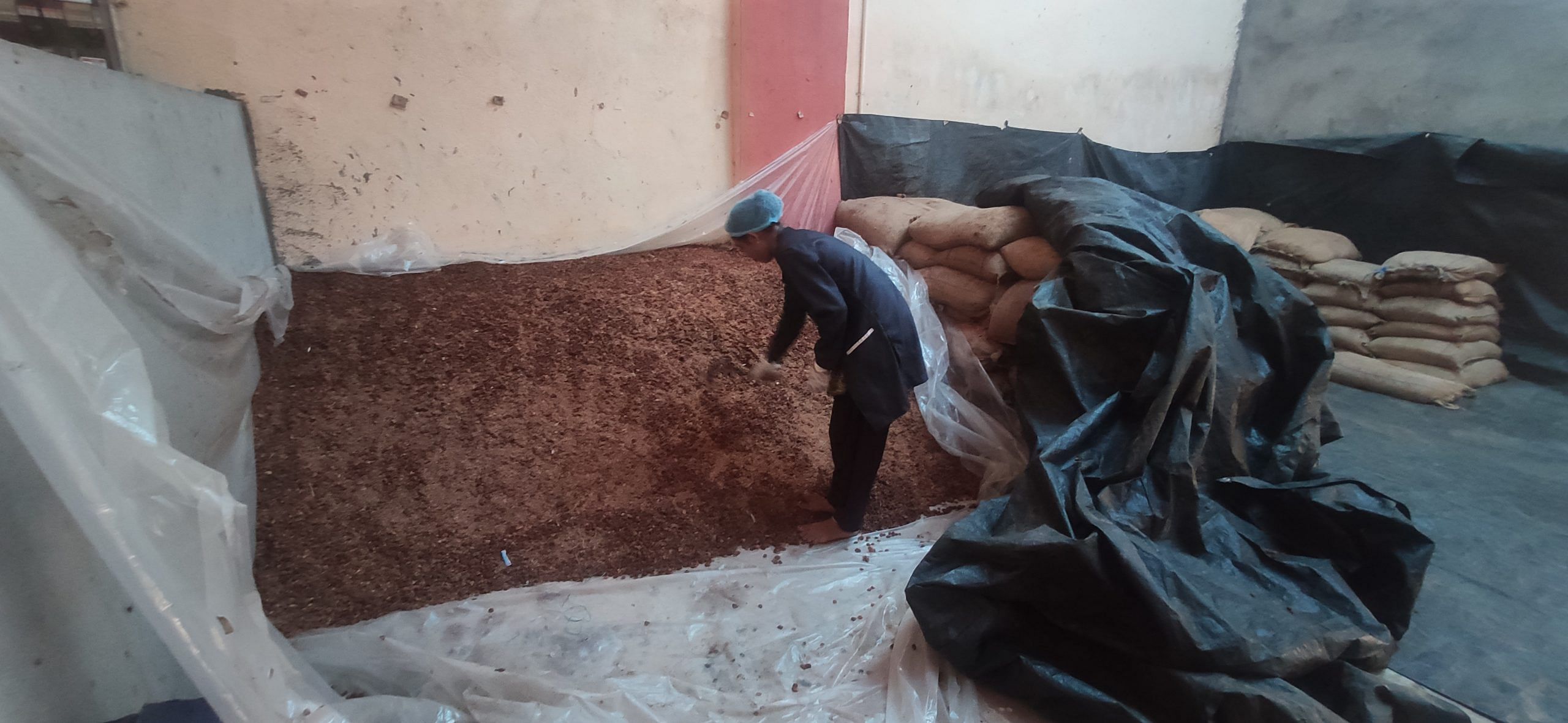
One of the few men in the warehouse is Chouhan, who was preparing for competitive examinations to become a primary school teacher in Indore. But the Covid-19 pandemic struck, leaving schools shut and his career as a teacher bleak. He returned to Alirajpur during the first wave of pandemic wondering what to do next when he received a WhatsApp message last year.
District officials were looking for people with a science background to help with the distillery. Chouhan, who has a bachelor of science degree, applied and was selected.
“My job is to monitor the sugar level before and after fermentation,” he said proudly, adding that the alcohol content in the final product is about 38 per cent.
For Bholi and others, producing their local mahua-based spirit and selling it to the public is a sweet victory after years of repression. It was banned under the Bombay Abkari Act 1878 and Mhowra Act 1892. Even after Independence, the public was forbidden from buying or drinking it, while tribals could only produce limited quantities for local consumption,and were penalised if they didn’t follow the rules.
Mahua is part of every tribal custom and tradition, says Bholi
Out of the 540 FIRs filed between January 2018 and December 2020 in three districts—Bhopal, Jabalpur, and Betul—33 per cent were related to the production of mahua, according to a report, Drunk on Power, by the Criminal Justice & Police Accountability Project.
“Mahua is part of every tribal custom and tradition,” said Bholi. The first batch produced in the Mond plant was offered to the tribal god Pithora Baba at his temple on the top of Dongri Mata hill in Katthiwada. The horse, which has become a symbol of Mond, is one of the sacred mascots of the god. The women are thrilled that they are getting a chance to share their stories and heritage with others.
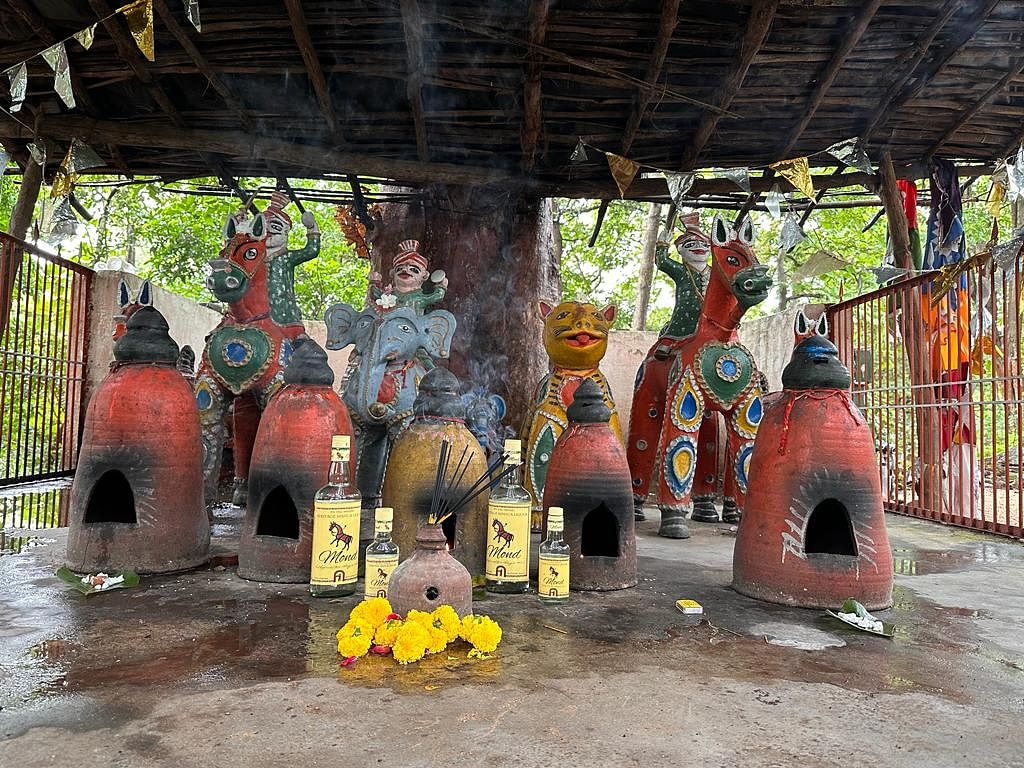
To raise a toast, Mookerjee suggests taking the crisp heritage spirit with a splash of soda and a slice of Godharaj lemon.
(Edited by Ratan Priya)


